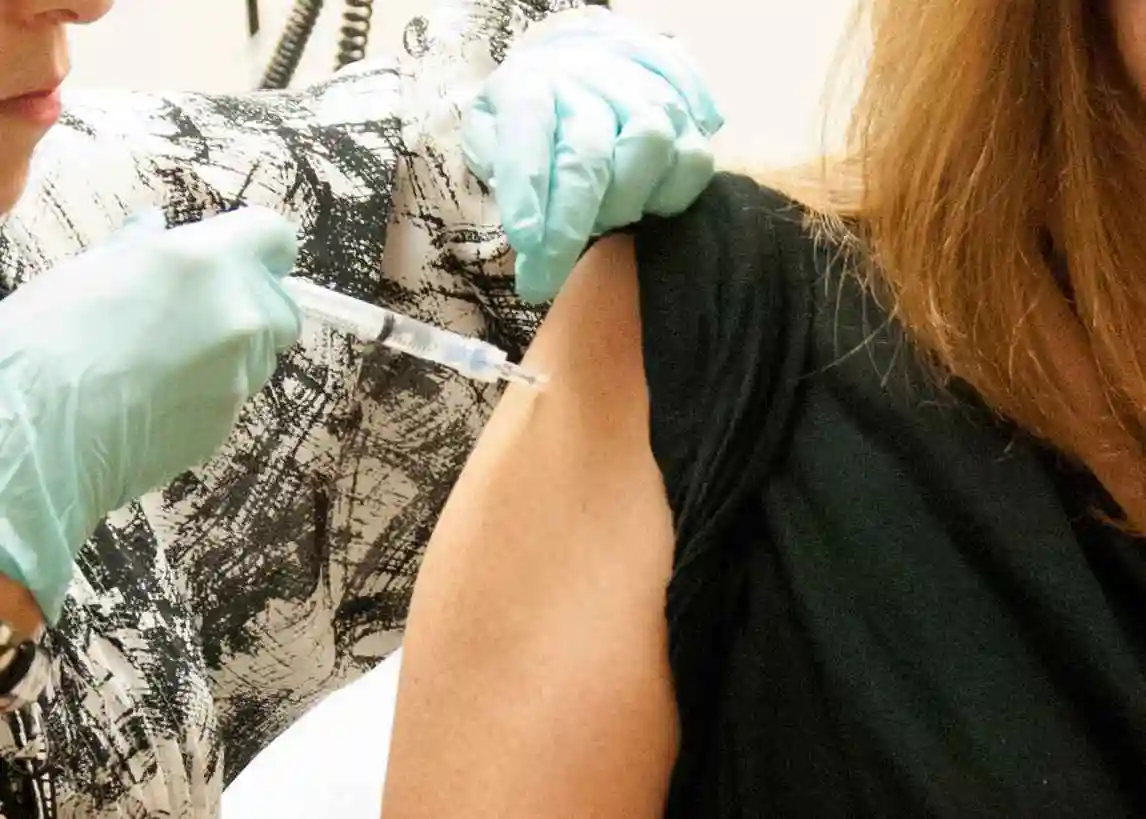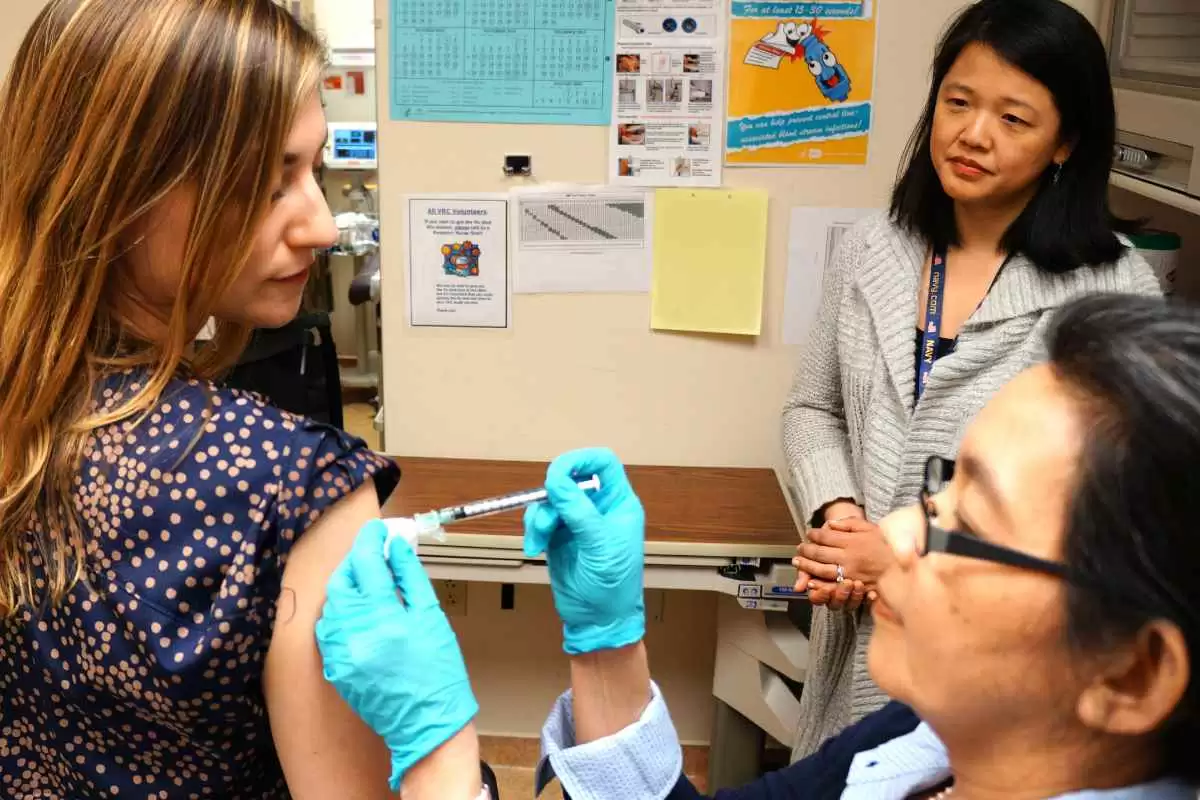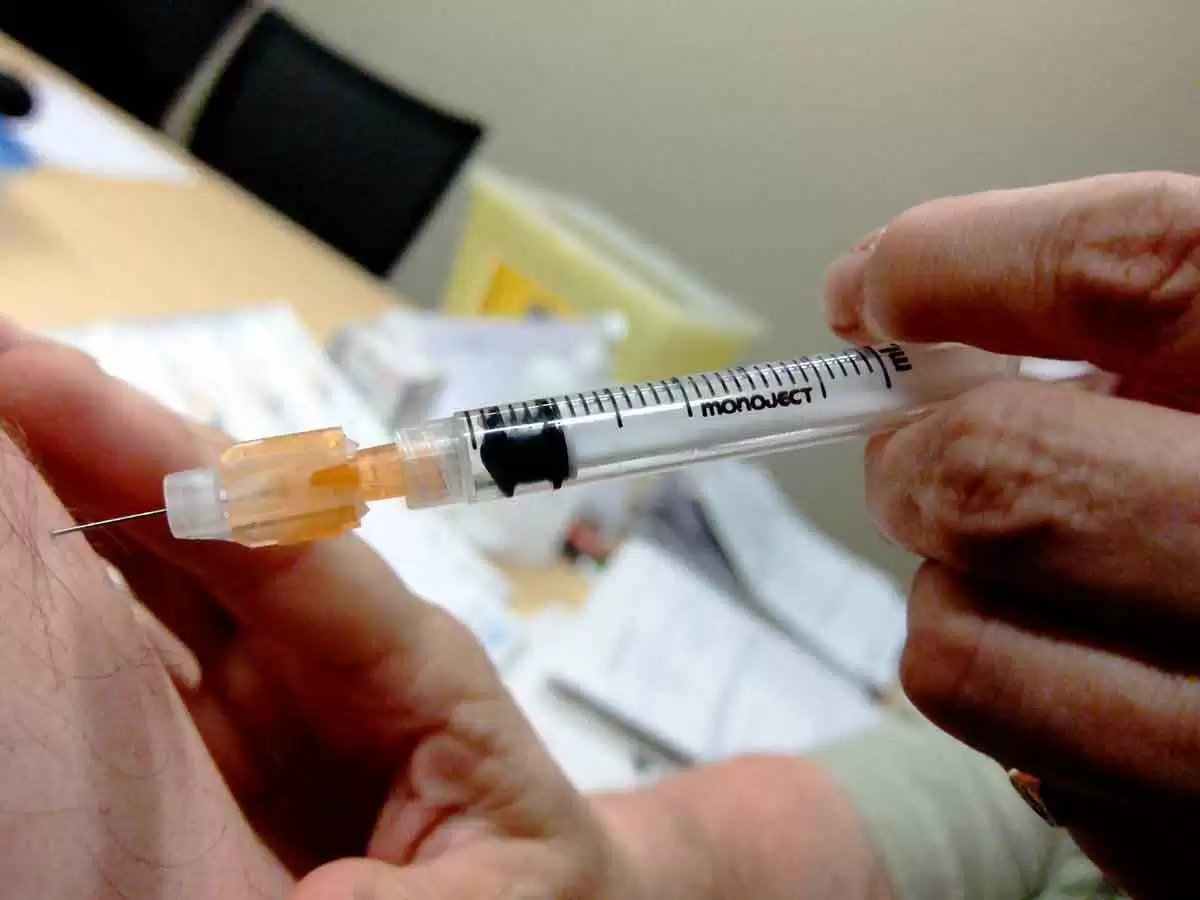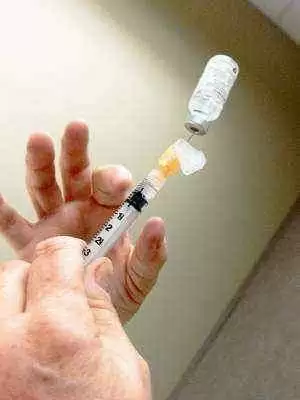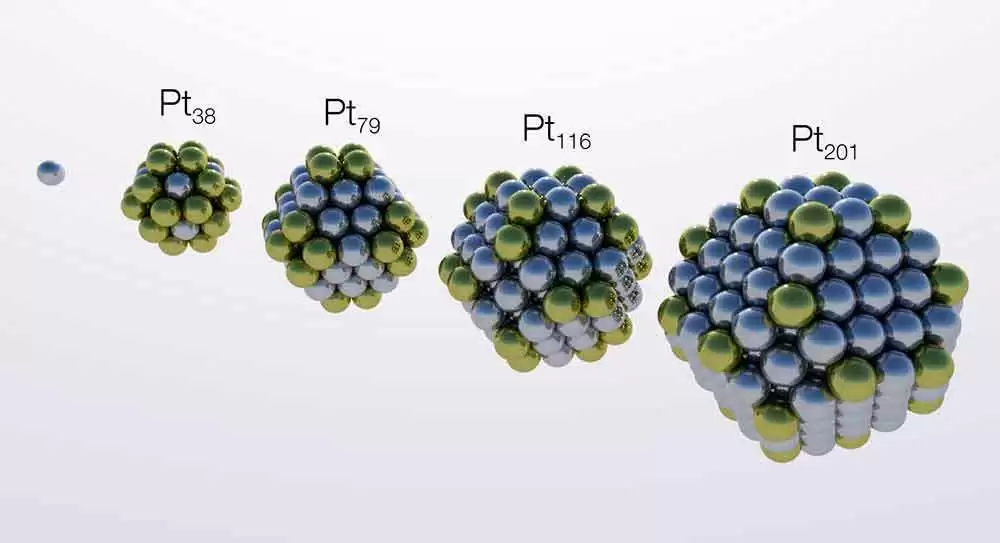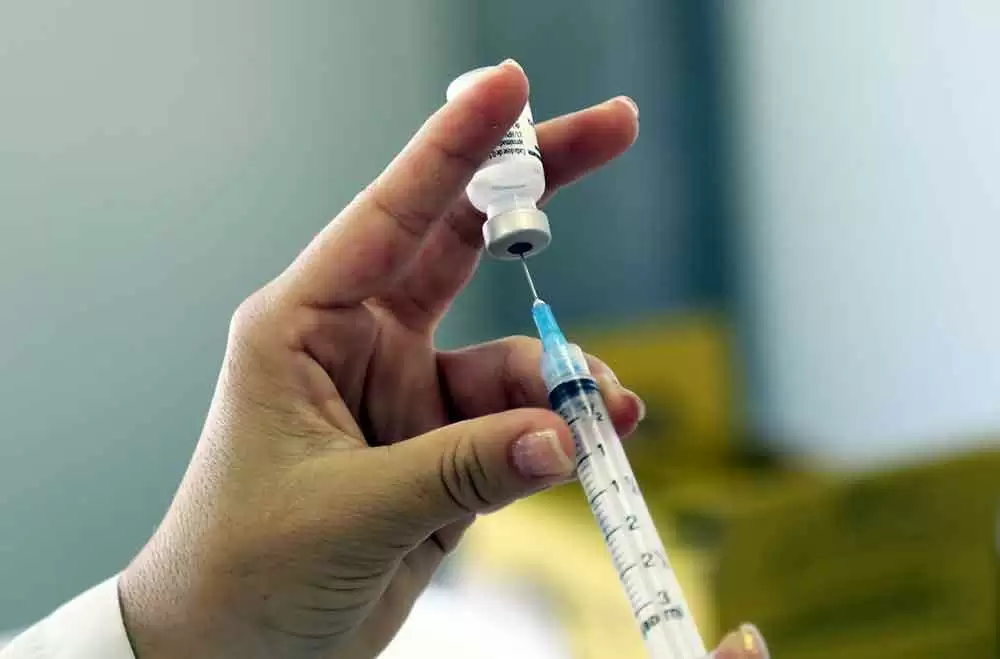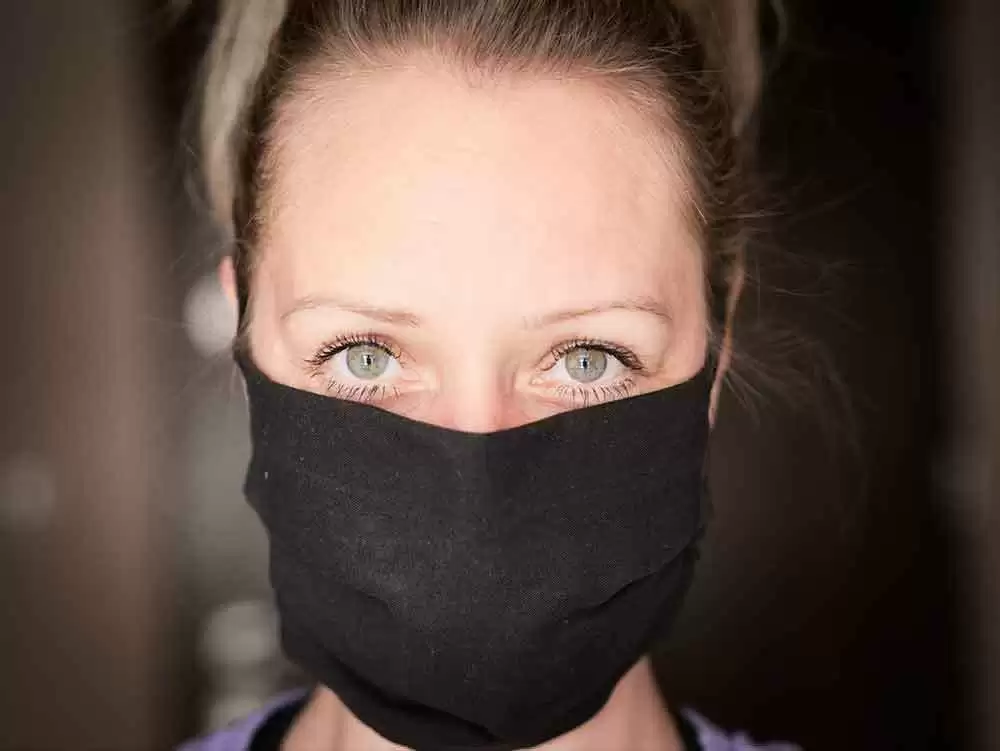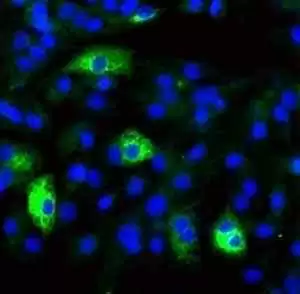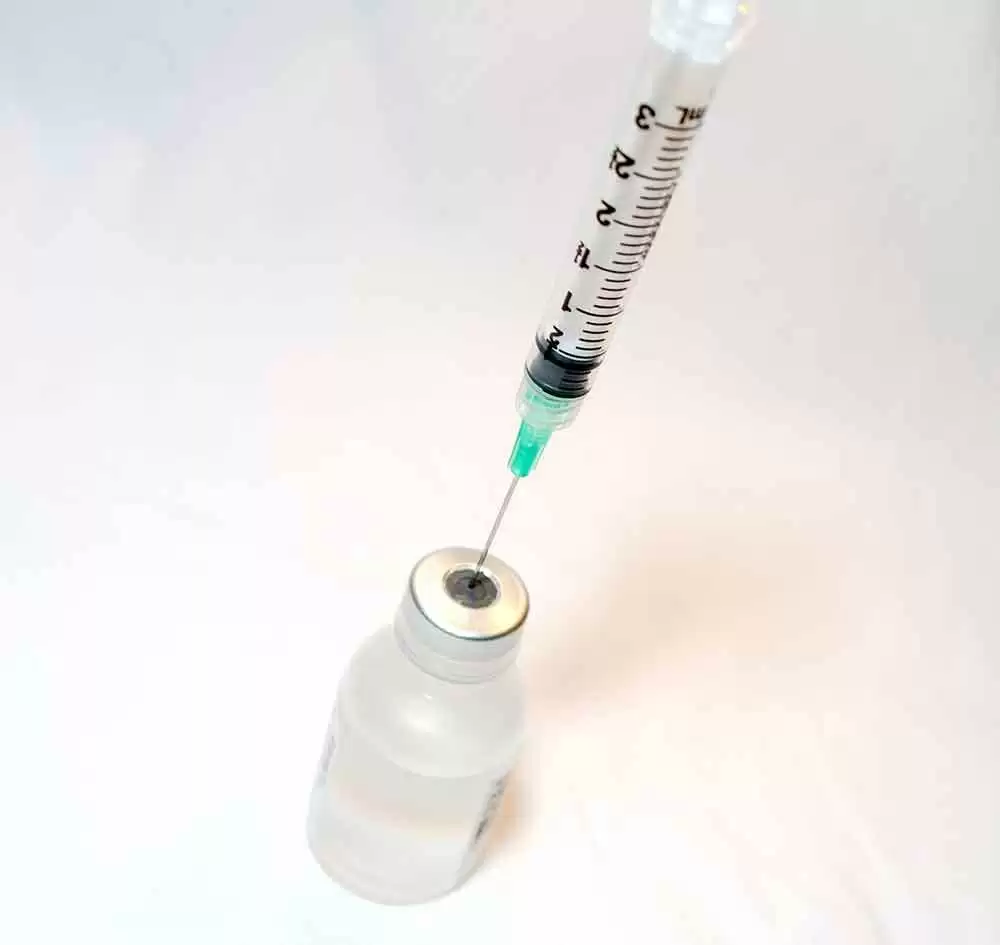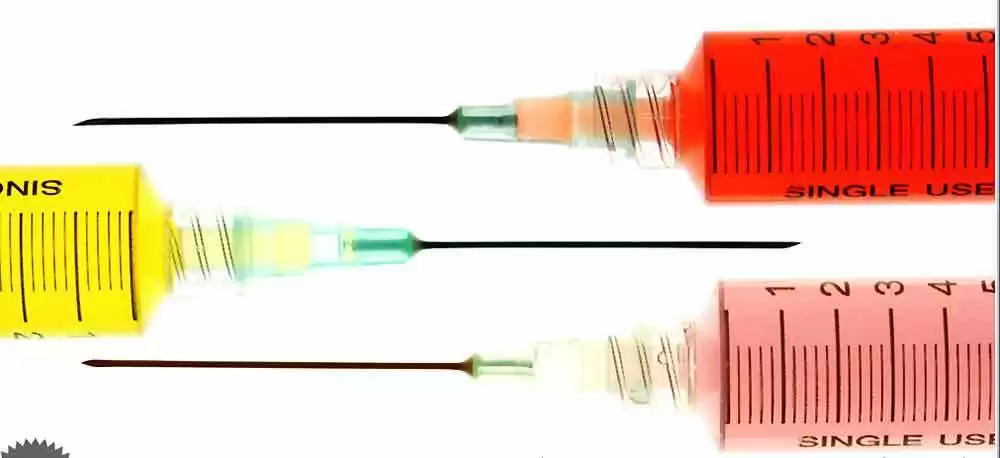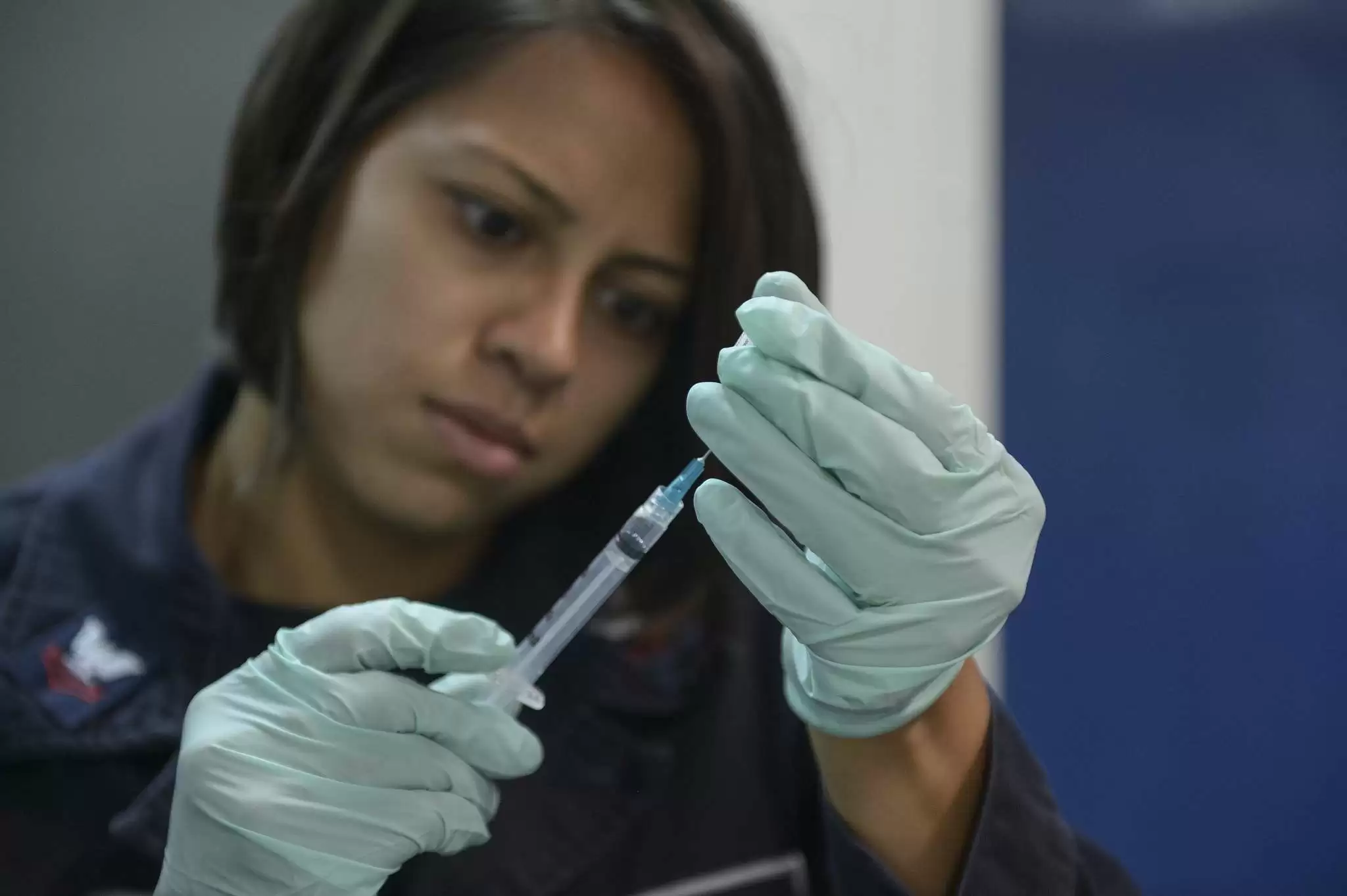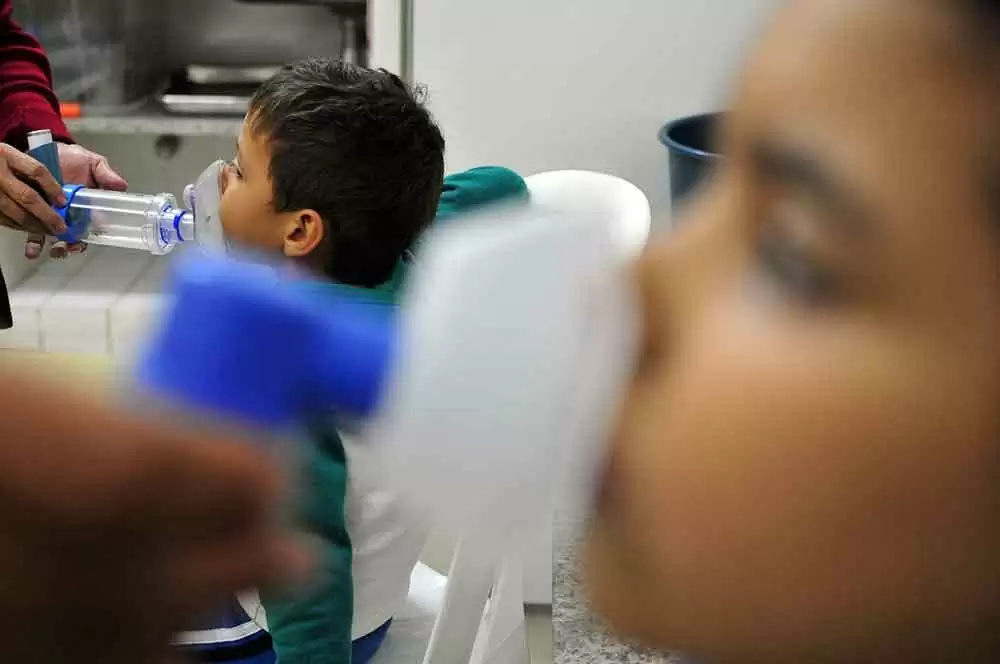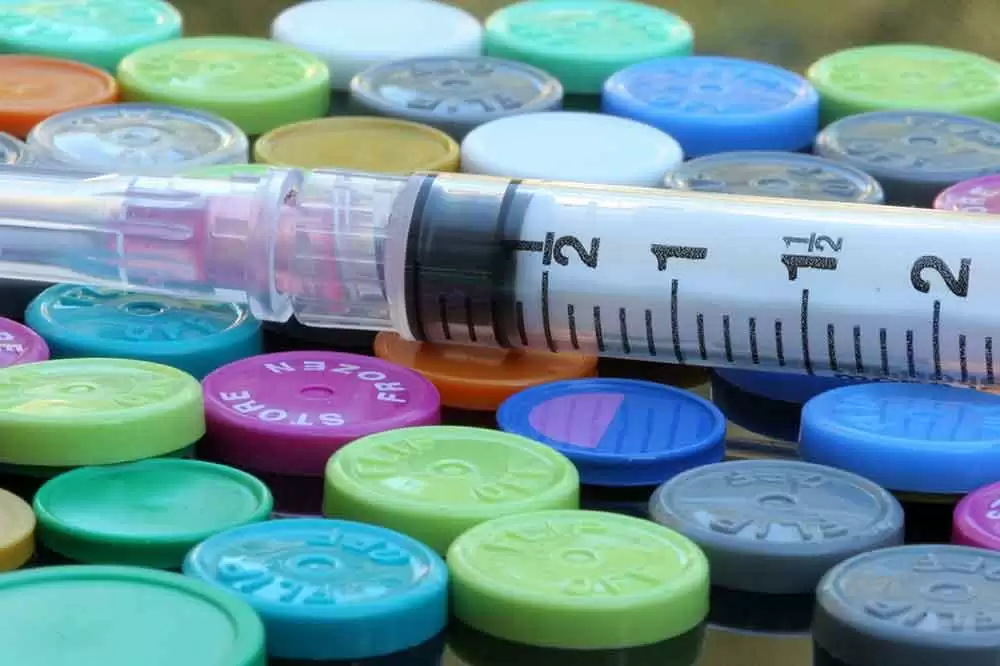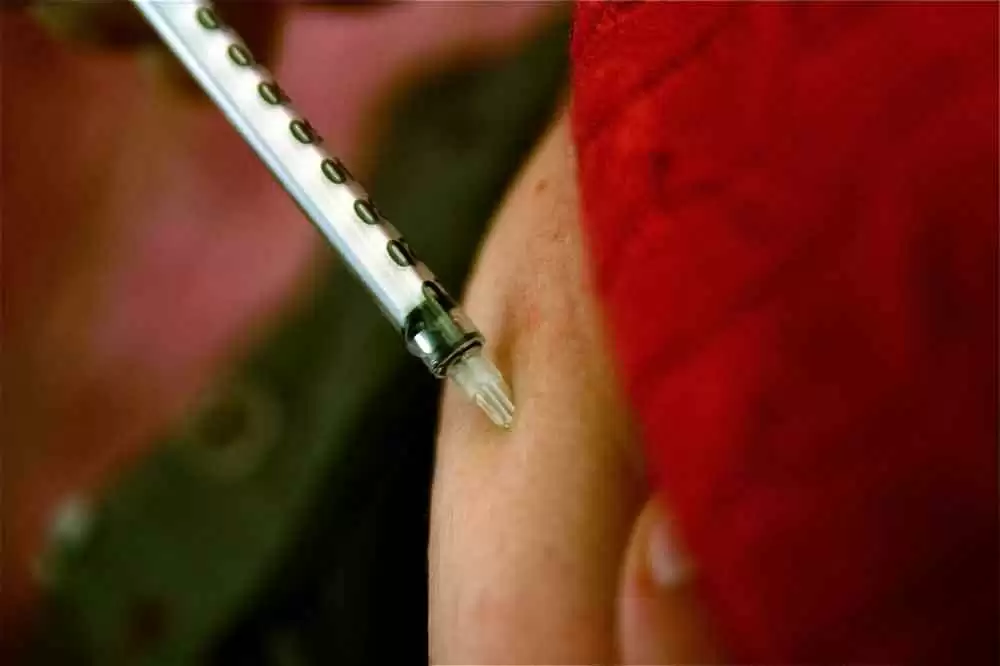-
Welcome to Celiac.com!
You have found your celiac tribe! Join us and ask questions in our forum, share your story, and connect with others.
-
Celiac.com Sponsor (A1):
Celiac.com Sponsor (A1-M):
-
Get Celiac.com Updates:Support Celiac.com!
Search the Community
Showing results for tags 'vaccine'.
-
Celiac.com 09/25/2023 - Professor Jeffrey Hubbell and a team of researchers at the University of Chicago's Pritzker School of Molecular Engineering has developed a novel type of vaccine known as an "inverse vaccine." This innovative vaccine has shown promise in laboratory settings for the treatment of autoimmune diseases such as multiple sclerosis, type 1 diabetes, and Crohn's disease. Importantly, it achieves this without suppressing the entire immune system, as is often the case with current treatments. Could such treatment work for celiac disease? How the Inverse Vaccine Works Traditional vaccines are designed to train the immune system to recognize and attack harmful viruses or bacteria. In contrast, the inverse vaccine takes a different approach. It aims to erase the immune system's memory of a specific molecule. This concept is particularly useful in autoimmune diseases, where the immune system mistakenly attacks the body's healthy tissues. The development of the inverse vaccine is based on the liver's natural mechanism of marking molecules from broken-down cells with signals that instruct the immune system not to attack them. Researchers combined an antigen (a molecule targeted by the immune system in autoimmune diseases) with a molecule resembling a fragment of an aged cell. This mimicry tricks the liver into recognizing the antigen as a friend rather than a foe, effectively stopping the autoimmune reaction. The research team successfully demonstrated the effectiveness of this inverse vaccine in halting autoimmune reactions in a disease model resembling multiple sclerosis. In multiple sclerosis, the immune system attacks myelin, the protective coating around nerves, leading to symptoms such as weakness, numbness, vision loss, and mobility problems. By linking myelin proteins to the molecule recognized by the liver, the researchers were able to prevent the immune system from attacking myelin. This allowed nerves to function properly again, ultimately reversing the disease's symptoms in animal subjects. Importantly, the inverse vaccine approach could have significant advantages over current treatments for autoimmune diseases. Many existing treatments involve broadly suppressing the entire immune system, which can lead to various side effects and increase the risk of infections. In contrast, the inverse vaccine offers a more targeted and specific way to modulate the immune response, potentially minimizing side effects. While further research is needed, initial phase I safety trials have already been conducted in humans with celiac disease, and are underway in multiple sclerosis. These trials are sponsored by the pharmaceutical company Anokion SA, which also contributed to the research. The development of clinically approved inverse vaccines is an exciting prospect, as they could provide more effective and precise treatments for autoimmune diseases, improving the quality of life for patients. Read more at the Pritzker School of Molecular Engineering
- 1 comment
-
- autoimmune
- autoimmune disease
- (and 5 more)
-
Celiac.com 06/03/2023 - This article first appeared in the Australian Coeliac newsletter, and is reprinted here by permission of the Australian Coeliac Society. By Robert Anderson, MD, Peter Gibson, MD and Finlay Macrae, MD. In 2002, the diagnosis of celiac disease means an end to delicious French pastries and the casual approach to diet that most people in the community enjoy. Today, strict adherence to a gluten free diet is the only effective treatment for celiac disease. A Vaccine for Celiac Disease? The good news is that new research in celiac disease suggests a "vaccine" may be feasible! Such a development has come from a greater understanding of the cause of celiac disease. You might say that we have known the cause of celiac disease for decades—"something" in gluten. But, there is more! We are all exposed to gluten but only some of us get celiac disease. This other factor is the characteristic of the immune system that makes the small intestine a "battleground" when it is exposed to gluten. The exciting advances are twofold. First, we have now identified the "something" in the gluten that makes the immune system angry (that is, the target of the immune response). Secondly, we now understand why only some people's immune system gets angry with gluten—it is all about the genes we carry that control the immune response. How the Advances were Made Almost all individuals with celiac disease have one of two genes involved in the immune response, HLA-DQ2 (90%) or HLA-DQ8 (5%). In the general population only 30% have one of these genes, let's call them A and B. These genes are also very common in early onset diabetes and thyroid disease (both quite commonly associated with celiac disease). A and B have the task of latching on to chunks of proteins (peptides) and carrying them to certain cells in the immune system called T cells. In celiac disease, we know that gluten peptides are indeed taken ("presented") to T cells via A and B. Gluten peptides attached to A and B then activate a proportion of the T cells present in the gut and cause the flattening of the intestinal villi known as villous atrophy— the pathologist's hallmark for diagnosing the disease. Ever since it was shown that gluten causes celiac disease, the challenge faced by researchers was to prove whether there are many, a few, or just one component of gluten that is "toxic"—that is capable of causing this damage. Most researchers thought that a wide range of components of gluten (peptides) were involved in causing celiac disease, and indeed a range of T cells reacting against various gluten peptides were found. This would have meant that the idea of a vaccine to abort this immune process to gluten (a process technically called "tolerance") was impractical. However, these early experiments with T cells were unable to show what really happened when gluten was exposed to the immune system in "real people" with celiac disease. Our work performed in Oxford, and to continue at The Royal Melbourne Hospital, Box Hill Hospital and Walter and Eliza Hall Institute in Melbourne, utilizes T cells from celiac subjects that have recently eaten gluten-containing bread. T cells induced by eating gluten could be measured in blood. To our surprise, these T cells initially targeted only one small component of gluten (a small peptide) in the most toxic fraction of wheat gluten (alpha-gliadin). Whether different peptides in the other components of wheat, rye and barley gluten are targets to which T cells react in patients with celiac disease is currently under investigation. How a Vaccine Might Work In animal diseases, the understanding of how T-cells respond is much further advanced than in humans. In fact, it has been possible to prevent and even treat animal diseases caused by T cells by "vaccinating" with T-cell target peptides. For example, nasal administration of peptide can prevent a mouse disease similar to multiple sclerosis. It "blocks" the subsequent immune response which is the hallmark of the disease. Why can't we do this in celiac disease? Celiac disease is the first human condition for which there is a clear understanding of the T-cell targets—a peptide in gluten. In work that is now planned in Melbourne, the possibility of a "vaccine" for celiac disease will be tested. The first stage of this project will begin in the next six months. But even if successful, it is still likely to be ten years or more before a "treatment" is ready for general use. These studies may provide celiac disease with its first alternative to a gluten free diet. Welcome back French pastries and crusty bread!
- 1 comment
-
- celiac disease
- treatment
-
(and 3 more)
Tagged with:
-
Celiac.com 10/03/2022 - In addition to their usual season pitch to seniors, doctors are recommending that people with celiac disease get a pneumonia vaccine. People with celiac disease face a greater risk for pneumonia than non-celiacs. However, about seventy-five percent of celiac patients fail to get a pneumonia vaccine after they are diagnosed, writes a research team in the journal Alimentary Pharmacology and Therapeutics. The recommendation stems from the team's 2016 study, in which the researchers used data on English patients collected between 1997 and 2011, including 9,803 with celiac disease and a comparison group of 101,755 people without celiac. The study was conducted by F. Zingone, A. Abdul Sultan, C. J. Crooks, L. J. Tata, C. Ciacci, and J. West, who are variously affiliated with the Division of Epidemiology and Public Health, University of Nottingham, City Hospital, Nottingham, UK; and the Coeliac center, Department of Medicine and Surgery, University of Salerno, Salerno, Italy. They found that, even though people with and without celiac disease had pneumonia at similar rates, people under age 65 with a celiac diagnosis, who didn’t get a pneumonia vaccine were nearly thirty-percent more likely to get pneumonia than those who were vaccinated. The problem may be related to impaired spleen function. Celiac disease can cause spleen issues for up to a third of patients, which may put them at greater risk for infections. Spleen function does tend to improve for celiacs on a gluten-free diet, which is another reason early diagnosis and quick adoption of a gluten-free diet is essential to a good prognosis. Dr. Shamez Ladhani of Public Health England in London, who was not involved in the study, told reporters for Reuters that "getting a flu vaccine can also help protect against bacterial infections like pneumonia," and also recommended that patients with spleen problems should get a flu vaccine every year and the pneumonia vaccine every five years. Read more in Alimentary Pharmacology and Therapeutics
- 3 comments
-
- celiac disease
- doctors
-
(and 3 more)
Tagged with:
-
Celiac.com 08/29/2022 - Rotavirus infection is a potential trigger for autoimmune diseases, and some studies have shown associations between rotavirus vaccination and autoimmune conditions, such as type 1 diabetes. There have also been a number of studies that show an association between celiac disease and childhood or infant rotavirus infection. But is there any association between the rotavirus vaccine and rates of celiac disease? A team of researchers recently set out to examine the association between rotavirus vaccination and celiac disease and autoimmune thyroiditis, both of which are associated with type 1 diabetes. The research team included Catherine Kim, Zhe Yin, Neil Kamdar & Grace J. Lee. They are variously affiliated with the Departments of Medicine, Obstetrics & Gynecology and Epidemiology, University of Michigan, Ann Arbor, MI, USA; the Institute for Health Policy and Innovation, University of Michigan, Ann Arbor, MI; and the Department of Pediatrics at the University of Michigan, Ann Arbor, MI. The team's retrospective cohort study used de-identified claims data to include more than 2.1 million eligible infants who were born between 2001 and 2018, and continuously enrolled from birth for at least 365 days. Nearly thirty percent of infants were born prior to the introduction of rotavirus vaccine in 2006; thirty-two percent were eligible for the vaccine, but were not vaccinated; nearly ten percent received partial vaccination; while nearly thirty percent received full vaccination. The team found 1,000 cases of autoimmune thyroiditis, and nearly 1,400 cases of celiac disease. Compared to unvaccinated children born after 2006, children who were born prior to the introduction of rotavirus vaccine in 2006 had lower risk of celiac disease. However, the risk for children who were partially vaccinated or fully vaccinated was similar to the unvaccinated children. Risk of autoimmune thyroiditis also corresponded to vaccination status. Based on the data, the team concludes that rotavirus vaccination has no effect on risk for celiac disease or autoimmune thyroiditis. Hopefully, this will alleviate any concerns about celiac disease or autoimmune thyroiditis and the rotavirus vaccine, and help parents to make informed decisions about vaccinating infants against rotavirus. Read more in Scientific Reports volume 12, Article number: 12941 (2022).
-
- celiac disease
- infection
-
(and 4 more)
Tagged with:
-

The Appeal of Vaccine Treatments for Celiac Disease
Scott Adams posted an article in Diagnosis, Testing & Treatment
Celiac.com 12/21/2020 - Recent leaps in understanding the development of celiac disease have led efforts toward a new, non-dietary, vaccine therapy. A lifelong gluten-free diet remains the only treatment for celiac disease, but research shows that even the most diligent gluten-free dieters are likely to be exposed to gluten on a regular basis. This is part of the appeal of safe, effective non-dietary treatments for celiac disease. And adjunctive and/or vaccine therapy is one of those approaches. New therapies might focus on immune regulation by IL-10, as in vitro models of treated celiac patients show that external IL-10 can overwhelm the gliadin driven IFN-γ response in intestinal biopsies. But, even though people with active celiac disease show high levels of anti-inflammatory IL-10 it's not enough to suppress the overwhelming Th1-mediated response. However, vaccination with gluten might trigger the extension of regulatory T cells, which could restore oral tolerance to gluten. It remains to be seen whether these approaches can strongly decrease the inflammatory intestinal response in celiac disease. A few experimental clinical trial studies have been run, though only one trial has used concurrent gliadin-based immunotherapy; that study is numbered NCT00879749 using the ClinicalTrials.gov Identifier. One recent study indicated a safety evaluation and estimates an inducible immune response by intradermal injections of Nexvax2 in treated celiac patients, which is specific to HLA-DQ2 patients. That vaccine contains three gluten peptides established by ImmunsanT for the treatment of celiac disease. These epitopes are responsible for the various immune responses by isolated T cells. A phase I in 40 HLA-DQ2+ celiac disease patients, using subcutaneous doses, showed no clinically applicable harmful effects. So far, however, few experimental therapies have been emerged as new targets for celiac disease in phase I–II trials and larger randomized controlled trials. Any suitable unique therapy needs to be harmless, operative and inexpensive. This invites further examination into the development of a new non-dietary treatment for celiac disease patients. Read the full paper by Mohammad Rostami Nejad of the Celiac Disease Department, Gastroenterology and Liver Diseases Research Center at Shahid Beheshti University of Medical Sciences in Tehran, Iran in the International Journal of Celiac Disease, 2015, Vol. 3, No. 4, 115-117.- 4 comments
-
- celiac
- celiac disease
- (and 5 more)
-
Celiac.com 04/28/2022 - Some studies have indicated that celiac disease patients may not fully respond to hepatitis B virus (HBV) vaccination, and may therefore be at greater risk of developing HBV infection. However, the data are far from conclusive. Also, there's not been much study on the risk of HBV infection in celiac disease patients. To get a clearer picture of the issue, a team of researchers recently set out to assess the response to hepatitis B virus (HBV) vaccination and the risk of HBV infection in celiac disease patients. The research team included Nawras Habash; Rok Seon Choung; Robert M Jacobson; Joseph A. Murray; and Imad Absah. They are variously affiliated with the Division of Pediatric Gastroenterology and Hepatology; the Division of Community Pediatric and Adolescent Medicine, Division of Pediatric Infectious Diseases; the Division of Gastroenterology and Hepatology, Mayo Clinic, Rochester, MN. For their cross-sectional study, the team used data from the National Health and Nutrition Examination Survey (NHANES) database, from 2009–2014, to assess the rate of HBV vaccination, immune response, and HBV infection risk in patients with and without celiac disease. The team calculated the rate of HBV infection via retrospective analysis of two groups of patients. The first visited the Mayo Clinic from 1998–2021, while the second was a stable longitudinally observed cohort, the Rochester Epidemiology Project (REP), from 2010–2020. Based on the NHANES data, the rate of HBV infection in the United States was 0.33%. Of 93 patients with celiac disease, 46 (49%) were vaccinated for HBV and of the remaining 19,422 without celiac disease, 10,228 (53%) were vaccinated. Twenty-two (48%) vaccinated patients with celiac disease had HBV immunity, while 4,405 (43.07%) of vaccinated patients without celiac disease had HBV immunity, which was not significantly different. NHANES data showed no cases of HBV infection in celiac patients. During the study period, the team found just over 3,500 patients with celiac disease who were seen at Mayo Clinic, and nearly four thousand patients with celiac disease in the REP database. Of those patients with celiac disease, only four (0.11%) at Mayo Clinic and nine (0.23%) of the REP patients had HBV infection. These data show that the rate of HBV vaccination and immunity was similar for individuals with and without celiac disease. Overall, they showed no greater risk of HBV infection for celiac disease patients. Based on these results, HBV screening and HBV revaccination to increase immunity is not required for people with celiac disease. Read more in the Journal of Pediatric Gastroenterology and Nutrition: March 2022 - Volume 74 - Issue 3 - p 328-332
-
- celiac disease
- hepatitis b
-
(and 4 more)
Tagged with:
-

Celiac Disease Vaccine Enters Phase 1 Clinical Trials in U.S.
Gryphon Myers posted an article in Latest Research
Celiac.com 09/10/2012 - Last year, ImmusanT's Nexvax2 celiac disease vaccine passed its phase 1 clinical trials in Australia and New Zealand, causing a stir of hope and anticipation within the celiac disease community. It will still be a while before the vaccine is available to the public, but yesterday ImmusanT announced that it commenced phase 1b clinical trials in New Zealand and Australia and phase 1 clinical trials in the U.S. New Zealand and Australia's phase 1b randomized, placebo-controlled, double-blind study will follow on the prior phase 1 trials and involve approximately 84 celiac disease patients on gluten-free diet at four study sites throughout the two countries. The focus of the study will be on evaluating safety, tolerability and pharmacokinetics (what the body does to the drug), as well as determining appropriate doses for subsequent studies. In the U.S., the phase 1 randomized, placebo-controlled, double-blind study will involve 30 celiac disease patients on gluten-free diet at approximately four test sites throughout the country. This preliminary study will evaluate safety, tolerability, and pharmacokinetics of the drug for American subjects. Patients in both studies will have confirmed diagnosis of celiac disease, as well as the HLA-DQ2 gene (which approximately 90% of celiac disease sufferers carry). Blood tests for gluten-reactive T cells will also be used to select suitable test subjects. The studies will employ an intradermal injection vaccine delivery solution by BD. The Nexvax2 vaccine is intended to restore the body's ability to tolerate gluten. It is hoped that antigen-specific T cells will be the key to allowing patients to consume gluten freely with no adverse effects. If all goes well during this and subsequent clinical trials, we could have a cure for celiac disease in the not-too-distant future. Source: http://www.sacbee.com/2012/09/04/4784050/immusant-initiates-clinical-trials.html- 27 comments
-
- celiac
- celiac disease
- (and 6 more)
-

Can Gliadin Nanoparticles Cure Celiac Disease in Humans?
Jefferson Adams posted an article in Latest Research
Celiac.com 03/28/2020 - In theory, celiac disease could be treated, and potentially cured, by restoring T-cell tolerance to gliadin. A team of researchers recently set out to investigate the safety and efficacy of negatively charged, 500 nm, poly (lactide-co-glycolide) nanoparticles encapsulating gliadin protein (TIMP-GLIA) in 3 mouse models of celiac disease. The research team included Tobias L. Freitag, Joseph R. Podojil, Ryan M. Pearson, Frank J. Fokta, Cecilia Sahl, Marcel Messing, Leif C. Andersson, Katarzyna Leskinen, Päivi Saavalainen, Lisa I. Hoover, Kelly Huang, Deborah Phippard, Sanaz Maleki, Nicholas J.C. King, Lonnie D. Shea, Stephen D. Miller, Seppo K. Meri, and Daniel R. Getts. Negatively charged, 500 nm, poly(lactide-co-glycolide) nanoparticles encapsulating gliadin protein (TIMP-GLIA) by antigen-presenting cells was shown to induce immune tolerance in other animal models of autoimmune disease. TIMP-GLIA did not elevate maturation markers on cultured human dendritic cells, or activate T cells from patients with active or treated celiac disease. The team assessed the model 1 delayed-type hypersensitivity, the model 2 HLA-DQ8 transgenic, and the model 3 gliadin memory T cell enteropathy models of celiac disease. Injections of TIMP-GLIA substantially reduced gliadin-specific T cell generation in models 1 and 2. Further, injections reduced inflammatory cytokine secretion in all three models, circulating gliadin-specific IgG/IgG2c in models 1 and 2, ear swelling in model 1, gluten-dependent enteropathy in model 3, and body weight loss in model 3. In model 1, the effects were shown to be dose dependent. Splenocytes from HLA-DQ8 transgenic mice given TIMP-GLIA nanoparticles, but not control nanoparticles, showed increased levels of FOXP3, and gene expression markers associated with improved tolerance. Injecting gluten-sensitive mice with TIMP-GLIA nanoparticles nearly eliminated the immune response to gliadin, and reduced markers of inflammation and enteropathy. This approach might be refined and used to develop new treatments for celiac disease in humans. Read more in Gastroenterology The researchers are variously affiliated with the Department of Bacteriology and Immunology; the Translational Immunology Research Program; the Department of Microbiology and Immunology at Cour Pharmaceutical Development Company, Northbrook, IL, USA; Department of Biomedical Engineering, University of Michigan, Ann Arbor, MI, USA; Department of Pathology, University of Helsinki, Finland; Precision for Medicine, Frederick, MD, USA; the Discipline of Pathology, School of Medical Sciences, Bosch Institute, Sydney Medical School, The University of Sydney, Sydney, Australia; the Department of Biomedical Engineering, University of Michigan, Ann Arbor, MI, USA; and the Interdepartmental Immunobiology Center, Feinberg School of Medicine, Northwestern University, Chicago, IL, USA.- 7 comments
-
- celiac disease
- cure
- (and 7 more)
-
Celiac.com 02/20/2019 - Pharmaceutical company ImmusanT is developing a celiac disease vaccine called Nexvax 2. Many vaccines provide long-term or permanent protection against disease after just one, or several doses. Because celiac disease is not caused by a virus, like polio, but is a response to the presence of an antigen (similar to an allergen that triggers an allergy), the approach to creating a vaccine like Nexvax 2 is different and, in some ways, easier, than creating a traditional vaccine, like the HPV vaccine. Nexvax 2 is a vaccine in much the same way that allergy shots are, but not in the way the polio vaccine is. Celiac Vaccine is Similar to Allergy Shots Unlike traditional vaccines, such as the polio vaccine, or the measles vaccine, Nexvax 2 does not inject a small dose of dead or weakened virus, or any virus fragment, into the patient to achieve disease immunity. Allergy shots work by desensitizing the body’s reaction by strengthening the immune system, thereby reducing or eliminating reactions to certain allergens. Nexvax 2 would work in a similar manner to allergy shots. It would build tolerance levels until there was little or no immune reaction to gluten exposure. Anyone who’s ever had allergy shots knows that their effectiveness can range from person to person. Some people get minimal relief, though most see good to excellent results. Many experience tremendous relief, and see their symptoms disappear. Nexvax 2 Faces Easier Path to Approval Because Nexvax 2 works less like a traditional vaccine, and more like allergy therapy, the process for testing and approval is potentially easier and shorter; several years, rather than a decade or more. The hope is that, once treated with Nexvax 2, “the immune system, now seeing these fragments of gluten in a different way, might learn to tolerate gluten," said Benjamin Lebwohl, director of clinical research at the Celiac Disease Center at Columbia University. Certainly, the ability to reduce or neutralize the body’s reaction to gluten in people with celiac disease would be a major breakthrough in the treatment of celiac disease. Benefits for celiac patients could include a reduction in severity of gluten contamination symptoms, and potentially an elimination of symptoms entirely. Nexvax 2 treatment, if successful, could allow some people with celiac disease to safely consume wheat. That is potentially huge news. Phase two clinical trials of the Nexvax 2 are slated for completion by the end of 2019. Read more: Promising Celiac Vaccine Nexvax 2 Begins Phase Two Trials
- 12 comments
-
- celiac
- celiac disease
- (and 6 more)
-

No Higher Covid-19 Risk for Celiac Disease Patients
Scott Adams posted an article in Additional Concerns
Celiac.com 11/23/2020 - Since March 2020, when the World Health Organization declared coronavirus disease-2019 (COVID-19) a global pandemic, researchers and laypeople have been wondering if people with certain health conditions, such as celiac disease, might face a higher risk for contracting Covid-19. Celiac disease is a chronic immune-mediated gastrointestinal condition triggered by gluten, which numerous studies have shown to be associated with an elevated risk of respiratory infection. A team of researchers recently set out to determine whether celiac disease patients have a higher risk of contracting COVID-19. The research team included Jamie Zhen, Juan Pablo Stefanolo, Maria de la Paz Temprano, Sebastian Tedesco, Caroline Seiler, Alberto Fernandez Caminero, Enrique de-Madaria, Miguel Montoro Huguet, Santiago Vivas, Sonia Isabel Niveloni, Premysl Bercik, Edgardo Smecuol, Luis Uscanga, Elena Trucco, Virginia Lopez, Carolina Olano, Pasquale Mansueto, Antonio Carroccio, Peter H. R. Green, Andrew Day, Jason Tye-Din, Julio Cesar Bai, Carolina Ciacci, Elena Verdu, Benjamin Lebwohl, and Maria Ines Pinto-Sanchez. At this writing, the world has seen over 34 million cases of COVID-19, and more than 1 million deaths worldwide. The United States has seen over 11 million cases of Covid-19, and 250,000 deaths, with rising numbers and no end in sight. The research team carried out a cross-sectional study to determine whether patients with self-reported celiac disease have an increased risk of contracting COVID-19. Between March and June 2020, the team used local celiac disease associations, electronic newsletters, and social media to recruit patients of all ages with a self-reported celiac disease, and non-celiacs, from different countries including Argentina, Australia, Canada, Italy, Mexico, New Zealand, Spain, Uruguay, and the United States. For the study, the volunteers answered forty-one questions in a web-based survey that was available in English, Spanish and Italian using the approach proposed by Mallinckrodt and Wang. The researchers used RedCap to gather data on demographics, gluten-free diet (GFD), symptomatology, and COVID-19 testing. They used SPSS version 25 (IBM, Armonk, NY) for statistical analyses, and then compared continuous and categorical variables using the Mann-Whitney U test and chi-square test. They also performed logistic regression to gauge the influence of various factors on the likelihood of reporting a positive COVID-19 test. Independent variables included celiac disease diagnosis, age, gender, comorbidities, gluten-free diet adherence, extra precautions, and previous COVID-19 exposure. The unadjusted and adjusted odds ratios showed 95% confidence intervals. People with celiac disease tend to have more comorbidities including respiratory, cardiac, and diabetes, compared with control subjects. Patients with celiac disease were significantly less likely to have been tested for, and to have been exposed to, COVID-19, compared with control subjects. Just under 9% of of 940 participants tested for positive for COVID-19. Overall, celiac patients do not face any higher risk of contracting Covid-19 than control subjects. This analysis should provide some assurance to people with celiac disease and to clinicians that patients with celiac disease have about the same likelihood of contracting Covid-19 as the general population. However, this study did not look at whether people who have celiac disease have worse outcomes than those who do have it, and unfortunately there is some evidence that indicates that this may be the case. With Covid-19 cases higher than ever and rising, we encourage everyone to take precautions and be safe. Read more in the Clinical Gastroenterology and Hepatology The researchers are variously affiliated with the Farncombe Family Digestive Health Research Institute, McMaster University Medical Center, Hamilton Health Sciences, Hamilton, Ontario, Canada; the Hospital Dr C B Udaondo, Buenos Aires, Argentina; Alicante University General Hospital, Alicante, Spain; ||Instituto Aragonés de Ciencias de la Salud, Zaragoza, Spain; Hospital Universitario San Jorge, Huesca, Spain; University Hospital of León, Leon, Spain; Instituto Nacional de Ciencias Médicas y Nutrición Salvador Zubirán, Mexico City, Mexico; Universidad de la Republica, Montevideo, Uruguay; University of Palermo, Palermo, Italy; Columbia University, New York, New York; Department of Paediatrics, University of Otago Christchurch, Christchurch, New Zealand; Walter and Eliza Hall Institute and University of Melbourne, Melbourne, Australia; and the Università degli Studi di Salerno, Salerno, Italy.- 4 comments
-
- celiac disease
- covid-19
-
(and 5 more)
Tagged with:
-
A team of researchers recently took a look at how well the hepatitis B vaccine protected people with celiac disease over time. Specifically, they evaluated what is called long-term antibody persistence and immune memory to hepatitis B virus in adult celiac patients vaccinated as adolescents. The research team included F. Zingone, F. Morisco, A. Zanetti, L. Romanò, G. Portella, P. Capone, P. Andreozzi, R. Tortora, and C.Ciacci. They are affiliated with the Department of Clinical and Experimental Medicine of Federico II University of Naples in Italy. They set out to investigate the anti-HBs antibody persistence and immune memory to hepatitis B virus in adult celiacs vaccinated as adolescents, along with the effects of a booster administration in non-protected individuals. They found that, eleven years after receiving the initial vaccine dose, the percentage of vaccinees with blood levels ≥ 10 mIU/ml and antibody geometric mean concentrations (GMCs) were lower among celiac patients than among control subjects (68.6% vs 91.7%, p Patients with anti-HBs below 10 mIU/ml received a booster dose and were retested after two weeks to measure response levels. Post-booster anti-HBs levels were still The study shows that, compared with healthy control subjects, people with celiac disease have lower seroprotective levels of anti-HBs eleven years after main vaccination, in addition to having a substantially lower response rate to a booster dose of the hepatitis B vaccine. Do you have celiac disease? Have you had a hepatitis B vaccine? Have you had trouble getting proper immunity levels with the hepatitis B vaccine? Is this news to you? Share your comments below. Source: Vaccine. 2011 Jan 29;29(5):1005-8. doi: 10.1016/j.vaccine.2010.11.060.
-
Celiac.com 07/09/2019 - Everyone in the Celiac community has read the press release about ImmusanT stopping the Phase 2 clinical trial of their drug Nexvax2. The drug was going to modify the immune system to ignore gluten. The hope was no more worries about cross contamination! However, in late June, ImmusanT issued a press release stating, "Nexvax2 did not provide statistically meaningful protection from gluten exposure for celiac disease patients when compared with placebo." Wait what? Let's go back a bit and talk about my experience in the clinical trial. I was in the Nexvax2 clinical trial. It consisted of five phases. The first phase was screening where they got all of your medical records that confirmed a celiac diagnosis and a gluten challenge. The gluten challenge was drinking a nasty gluten drink with the equivalent of 2 slices of bread and to evaluate your reaction and confirm that it was violent enough. The second phase involved updosing. We had to go to the center twice a week for six weeks to receive dose increase injections of the medicine. (I'm going to refer to the test drug as medicine - I don't know if I got Nexvax2 or placebo, but it's just easier to say medicine.) During this phase, I did experience some side effects. Occasionally I would be exceptionally tired or have an upset stomach. It was not bad and nothing that couldn't be managed with a nap and acetaminophen. The third phase was maintenance dosing. We had 10 weeks of bi-weekly self injections of the full dose of the medicine. The fourth phase was the food challenges. The fifth stage was post study testing. Last time I wrote about my experience, I was all the way into self-injections. I was given 20 pre-filled auto-injectors. I was given a schedule and a log to note when and where I injected. All of these shots went into my stomach. My abdomen was divided into 4 quadrants at my belly button - upper right, upper left, lower right, and lower left. I rotated where the shot went into my abdomen. They didn't hurt at all. I also noted the date, time, and whether or not I received the full injection. During this time, I never felt better. My energy levels were up. My weight was dropping without even trying. I was sleeping better. I was exercising better. I had normal bowel movements—which I haven't had in over 10 years—long, soft, well-formed just perfect. Dr. Oz would be proud. All of my celiac symptoms went away. It was like I was normal. This was a very, very good time for me. At week 6 of the 10 maintenance doses is when the food challenges began. There were three food challenges. In the three challenges, one challenge would be gluten, one challenge would be placebo, and the third would be of their choice, either gluten or placebo. So, I could potentially get gluten twice or a placebo twice. For the first challenge they brought out a big white box with my name on it. Inside were three smaller boxes labelled 1, 2, and 3. The smaller boxes contained a shaker bottle, water, and the powder that could be gluten or placebo. If it's gluten, it has the equivalent of two slices of bread. To start the test I had five minutes to consume the drink. This part was mentally challenging for me. In the first phase of the study, I knew I was getting gluten. I could prepare. I knew I was going to be sick and was doing this on purpose for science. That I could handle. This time I didn't know whether I was getting gluten or not. It is mentally tough to not know what you are getting. What happens if I react? What happens if I don't react? Does that mean this is a placebo? Does that mean I got a placebo instead of the medicine? What if I got the drug and I still react? Am I an outlier? What does that mean for the study? All of these things were going through my head as I was mentally preparing to drink the beverage. I cannot explain how challenging it was to drink that drink with the time pressure, not knowing what would happen. The first challenge went well. No reaction. I was a little nauseous but nothing like my first trip down the gluten road. All was well. It would be two weeks until the next challenge. Here's where things go a little sideways. I had to go to California between the first food challenge and second food challenge to help a relative who was recovering from a stroke. I packed my study medication, got on a flight, and flew out to the West Coast. Getting the auto-injectors through security was easy with my doctor's note, as well as the frozen ice packs needed to keep the Nexvax2 cold. On my first day in California I woke up with pink eye and a terrible cold. Off to urgent care I went for medicine because I can't risk giving my relative pink eye or a cold. I got pink eye medicine and amoxicillin. I was in California for about a week and planed to fly home the following Tuesday. I finished the antibiotic on Tuesday, and did my injection on Wednesday, per the protocol. Thursday I did the food challenge. This second challenge did not go well. I threw up about an hour after drinking the food challenge drink. That stunk. But I will say this. When I drank the gluten drink at the beginning of the study, I was sick for a week. On the couch with extreme exhaustion, gastrointestinal distress, and just general yuckiness. When I woke up on Friday, I didn't feel bad. I felt quite good. The change between feeling bad for a week and being able to bounce back from a glutening was glorious. Not all that is good, can stay good. At about 2:45 that afternoon, my left ring finger became exceptionally itchy, red, and started to swell. I was on my way to pick up my kids from school and stopped to buy some Benadryl cream for my finger. As the day progressed, my finger started to swell and continued to be itchy. By 5 that night, the swelling and itchiness had spread to my palm and my right hand was beginning to itch. By 7 that night both of my hands were so swollen I couldn't make a fist. I had been drinking Benadryl like it was wine and it was not making a dent in the itch or the swelling. By 9 that night, my neck started itching. By the time I left for the Emergency Department at 11 that night, my hands were so swollen I couldn't bend my fingers and both my hands and my neck were incredibly itchy. After a few hours in the waiting room, I saw the doctor and he said I was having an allergic reaction. He contacted the study doctors confirming that I was having an allergic reaction. They said to make sure I was safe, give me whatever medication was needed, and don't worry about the study. My health and safety came first. I was given IV Benadryl and steroids and sent home. One of the reasons someone was not going to be able to be in the study was taking an oral steroid 6 months prior to the first injection. I was lying in the ER four injections from the end of the study realizing that my participation in the study may be over. The ER doctor did not know what could have caused the reaction and wouldn't hazard a guess, but did say that an allergic reaction to amoxicillin could start several days after stopping amoxicillin. I was told to not do any more self-injections until further notice. After a few days, the swelling in my hands went down and returned to normal. There doesn't seem to be any long term effects from this episode. Over the next few days, the study doctors and the people from ImmusanT talked about my case. They decided for my safety that I should be removed from the study. I felt like my rocket engine propelling me toward a cure just flamed out. But they were right. We don't know why I had a reaction and we could not risk me having another, potentially more severe reaction next time. I had to go to the study center to return the four remaining auto-injectors, do final blood testing, and final testing for the study. It was a very sad day for me. I felt like a failure. My body failed and there was nothing I could do about it. I still feel like that study is unfinished and it makes me sad to write my story. Reading the notice that the Nexvax2 trial was terminated early was another blow to me. It was even worse knowing how good I felt on the medicine. It was worse knowing that after the food challenge my reaction was totally different than the first gluten challenge. I believed it worked for me. I feel like I failed, not the medicine, by having an allergic reaction. So when they stopped the trial, I felt like a failure again. Looking ahead. I hope they look at the data and can find something good in it. I hope they are able to see that the daily journal of side effects went to almost zero when I was on the medicine compared to symptoms almost daily before starting the medicine. I hope they can retool the study to maybe not test against such a high gluten dose. I mean since when is cross contamination the gluten equivalent of 2 slices of bread? Normally, if we get glutened, it is a much smaller amount that makes us sick. Heck, the FDA says anything more than 20 parts per million causes damage, so maybe they could test against a smaller amount of gluten. I think that's where I would look if I were the ImmusanT scientists. I also have to remember that Nexvax2 is only one of several drugs that are currently in clinical trials for celiac disease. While I hope to see Nexvax2 again, there are other drugs with real potential. I had hoped Nexvax2 was a cure, but I would be temporarily satisfied with something that allowed me not to worry about every single morsel of food I put into my mouth making me sick. As a side note, I write a blog and talk about clinical trials all the time. I found a celiac study looking for healthy volunteers. I had several healthy parents of celiac kids asking for more information so they could volunteer to help propel the quest for a cure forward. The idea that these parents are willing to put themselves in a clinical trial in order to help their children has always demonstrated the quiet hope for a cure that I think we all feel. I firmly believe the cure for celiac disease will be here in the next 10-15 years. I'm not sure what it may look like but I do know this—each person with celiac disease and has the ability to volunteer for a clinical trial should. It is worth the time and effort and will potentially pay big dividends in the future for all of us. Science can't advance without some of us putting our bodies on the line. In closing, my clinical trial ended in March. I believe my body is working better today than it did before the trial and it's now July. My old celiac body is creeping in, but it still isn't as bad as it was before the trial.
- 13 comments
-
- celiac
- celiac desease
-
(and 4 more)
Tagged with:
-
Celiac.com 07/01/2019 - Drugmakers have pulled the plug on a phase II trial of Nexvax2, a promising drug for treating celiac disease. Pharmaceutical company ImmusanT, said that "results from an interim analysis revealed Nexvax2 did not provide statistically meaningful protection from gluten exposure for celiac disease patients when compared with placebo." That's a lot of fancy language to say that the drug simply didn't work. It did no better than a placebo. If there were any other way to spin it, the company would have spun it. They didn't. That basically means total failure. We've written about Nexvax2 over the years, and followed it through its development. It was promising enough to earn fast-track development status by the FDA. The company's press release reads as follows: ImmusanT Discontinues Phase 2 Clinical Trial for Nexvax2® in Patients With Celiac Disease CAMBRIDGE, Mass. – June 25, 2019 – ImmusanT, Inc., a clinical stage company leveraging its Epitope-Specific Immuno-Therapy™ (ESIT™) platform to deliver first-in-class peptide-based immunomodulatory vaccine therapies to patients with autoimmune diseases, has discontinued the Phase 2 global study for its lead candidate, Nexvax2®, intended as a treatment for celiac disease. Similar to earlier Phase 1 results, Nexvax2 was found to be safe and generally well tolerated. There were no concerning safety issues identified during the study. ImmusanT will be actively investigating data gathered from the trial to further understand this outcome. The company will provide further information once available." So, to boil it down: The drug is safe and well tolerated, but it doesn't work any better than a placebo. The company will not pursue further testing. That's sad news and an ignoble end for a drug that held such high hopes. Few topics have generated as much excitement among celiac sufferers as the tantalizing possibility of a vaccine. Many eagerly hoped for success, while some wouldn't take it on a bet. It's unclear what this means for the technology behind Nexvax 2, as the underlying mechanics for this vaccine, Epitope-Specific Immuno-Therapy (ESIT), were to serve as the platform for future autoimmune treatments. Stay tuned for more on this and related stories.
- 10 comments
-
- celiac
- celiac disease
-
(and 7 more)
Tagged with:
-
Celiac.com 03/22/2019 - I'm going to talk about my journey through the Nexvax2 trial. It is a clinical trial to study the effectiveness of this drug to prevent mucosal damage due to cross contamination. There are 4 phases to this trial - Screening, Updosing, Maintenance, and Post-Study. Each phase has different requirements from the patient and different goals. Screening for the Nexvax2 Clinical Trial I found out about the Nexvax2 trial from my sister. Her job involves keeping up with medical stocks. She saw that ImmusanT had started their clinical trial - a double, blind, placebo controlled study for an injection to retrain the immune system to stop recognizing gluten as a foreign invader. It works similarly to allergy shots desensitizing the immune system to gluten. I looked up the trial at ClinicalTrials.gov and made a phone call to the nearest location. There were 35 trial locations across the US and a couple of locations in Australia. I live in Atlanta and the closest locations were in Jacksonville, FL or Nashville, TN. I decided to call Nashville because it is only a 4 hour drive compared to the 6 hour drive to Jacksonville. I called and talked to Nurse Ratchet (not her real name, to protect the innocent). She explained that it was a long trial, about 7 months, and that I had to be in Nashville twice a week for six weeks. She said she would send me the patient disclosure and she would answer any questions I had when I was ready. She also said that I needed to be able to prove my Celiac diagnosis with both positive blood work and positive endoscopic biopsy. I would have to be on a gluten free diet for 12 months. I would also have to carry the DQ2.5 gene and do a gluten challenge. I will also have to decide if I'm going to participate in the optional endoscopy portion of the trial. The twice a week for six weeks thing threw me for a loop. That would be a big time commitment, hard on my family, and very expensive. I wasn't sure we could do this. As my husband and I review the disclosure document, there is a lot of information to take in. One of the requirements to get in the trial is having the DQ2.5 gene. I've had genetic testing done several times and knew I had one copy of DQ2.5. In reading the documents, if you have one copy of DQ2.5, you have a 1 in 2 chance of receiving the drug. If you have two copies of DQ2.5, you have a 2 in 3 chance of receiving the drug. Nexvax2 does not work for those with DQ8. According to research, over 90% of people with Celiac have DQ2.5. So, I have 50/50 chance of getting the medicine and I have to be in Nashville twice a week for six weeks. That is a big time commitment for a 50/50 chance at the medicine. We decide it isn't worth it. Until, I talk to Nurse Ratchet and she confirms that if I get placebo in the trial, I will get the medicine when the drug is approved. Now we are talking. I have a 100% chance of getting the medicine - either sooner or later. We decide to go for it!! I find my medical records that demonstrate I have Celiac disease, send them to Nurse Ratchet and we schedule my first appointment - November 1. The first appointment lasts for 8 hours. The initial testing involves blood work, urine tests, EKG, physical, and do a gluten challenge. This is going to be a very long day. The gluten challenge is the most worrying part. I will have to ingest a lot of gluten - the equivalent of two slices of bread. They will gauge my reaction after the drink and monitor me for the next few hours. I have 5 minutes to consume the unflavored gluten drink. At this point, you might be thinking why would I purposefully ingest gluten? I'm poisoning myself. I know I'm going to be sick. What sane person does this? A person that is tired of being sick. I'm tired of worrying about food all the time. If this is what I have to endure to ensure that I can get better, I'm in. After consuming the gluten poison, we wait. After about an hour, I start feeling fatigue - mind numbing fatigue. The kind of fatigue that you just want to lay in a dark, cool room under a blanket thinking of nothing. At hour two, the vomiting starts. I throw up twice in about a 30 minute span. My reaction is severe enough to qualify into the study. But now I have to start to deal with the consequences of glutening myself. Once the testing is over, I get on an airplane and fly home. That was a miserable flight. I won't bore you with the unpleasant details, but know the flight was not good. I'm miserable the whole week after the gluten challenge. Fatigue, brain fog, gastrointestinal distress, and just feeling bad is what I dealt with for a week. A full seven days of being completely incapable of living my life in any meaningful way. It was a week of watching TV, ordering food in, and just breathing. Eventually I get better. When the malaise lifts, it lifts like opening a curtain to reveal bright sunshine. I am finally better. We opted to do the optional endoscopy study. I had to go back to Nashville at the beginning of December for the endoscopy. The flight, fasting, and doing the test in the early afternoon did not make for a great day. Really, it was a very bad day. Normally, I don't struggle with endoscopies. Normally I simply do the endoscopy and go eat a big meal and am fine for the rest of the day. This time I slept from about 1 hour before my procedure, through the procedure (they gave me good stuff to help with that), and then on the 4 hour car ride home. I slept a lot that day. Then we wait. We have to wait for all of the blood tests and endoscopy results. About a week after the endoscopy, Nurse Ratchet confirms I have made the cut. I'm in the trial! During the trial, I had to promise to not start taking any supplements or medicine without letting them know. I had to put a card in my wallet that said that I was in a clinical trial and it not give me medicine until the doctor called this number. There are also surveys you have to fill out on the little device they give you. You have to do them every night and they must be completed between 6 pm and midnight. Most days it is two surveys - one asking about symptoms and one about your bowel movements. The one about the symptoms asks you to rate how your symptoms are on a scale of 1 to 10. The other asks how many bowel movements you've had and tell what they were like on the Bristol Stool Chart. In the whole 6 month period you are only allowed to miss 4 surveys. I set two alarms to remind me - one at 6 pm and one for 8:30 and carried the device with me at all times so I could do the survey when ready. We have completed phase 1 - the screening phase. Now, it is time for phase 2 - updosing. Updosing: Reaching the Nexvax2 Dosage In reading the consent document, updosing is important because when they tried to give people the full dose of the medication in Phase 1 trials the side effects were too dramatic and people dropped out. The main side effects of this medicine are headache, fatigue, and diarrhea. Those side effects are the same for me when I get cross contaminated so I wasn't worried about the side effects. On the first injection day, I had to be in Nashville for for 4 hours so medical personnel can watch you and make sure you don't have an allergic reaction. They use a small insulin needle to inject the drug, so it doesn't hurt. The shot does have to go into your belly, so that's a little weird. I would have preferred it in my arm! The first dose is a very small dose of the medicine with a lot of saline. Over time the amount of medicine increases and saline decreases until about half way through. About half way through the up dosing, you get the medicine straight, no chaser (no saline). The updosing is not a challenge. I did have periods where I did experience side effects. Occasionally, I had problems with fatigue and headache, but it did not affect my life or how I functioned. There was one time, specifically, I had an issue with fatigue and headache. This was a bad headache. It did not let up with ibuprofen or acetaminophen alternating every 4 hours. It was about half way through the updosing and it lasted for about 3 days. Then it lifted. Everything was gone and I was back to feeling good. Also over the course of this study, I've had periods of flushing. Flushing where my face and neck would turn bright red and feel like they are on fire. When this happens, I would take a Benadryl and go to bed. My mom thinks it is menopause, but that's just for old ladies, not me. The hardest part about updosing was the travel and the grind of going twice a week. I also was doing this in December and January. December and January are hard because of the holiday season, but we also have 3 family birthdays during the span of this period. But we made the best of it and one time the whole family came with me and we spent a couple of days in Nashville. Maintenance Dosing Once updosing is complete, maintenance dosing starts. Maintenance dosing is 10 weeks of twice weekly injections of the full amount of medicine. They are self-injections. The injections need to stay refrigerated, so I have this super cool cooler in my fridge. TSA didn't even flinch when I came through security! I got 20 auto-injectors for the ten weeks of twice weekly injections, alcohol swabs, and a log book. I had to log the date, time, and location of my injection. You inject in a pattern in your abdomen- upper right, lower left, lower right, and finally upper left. I will say this phase was a bit of a relief for me. It meant less travel and just kind of coasting along. Until, the food challenges - duh duh duh daaaaa! The food challenges are to see if the medicine is working. There are three food challenges - one gluten, one placebo, and one either gluten or placebo. So, you will get gluten at least once but not more than twice. The challenges are spaced two weeks apart. The procedure for the food challenge is much the same as at the initial gluten challenge. They do the normal stuff - weight, blood pressure, and temperature. Then they pull out the big white box with my name on it. Inside the big white box is three smaller white boxes. They all are sealed. These are my food challenge boxes. She takes the first box out and opens it. It contains a shaker bottle, a box of water, and two packets of powder. One packet of powder is flavoring and the other is the test material. She mixes the drink per the instructions and I have 5 minutes to consume this beverage. The drink is pink and overly sweet. (At the gluten challenge, there was no flavoring. Just straight up gluten.) The test drink tastes terrible, but I consume the beverage. Then we wait. We wait to see if my body reacts the same or differently to the initial gluten challenge at the start of the trial process. It is just a waiting game. They said I could keep the shaker bottle we mix my food challenge drinks in. They are really nice shaker bottles. I cannot keep them. I truly never want to see those shaker bottles again. Those shaker bottles are my enemy and I want no part of them. Those shaker bottles make me sick and I don't want them. I've done two food challenges to this point. One I had no reaction and the other I reacted. I threw up, but I wasn't tired for a week. I was tired for 24 hours. So, that's where we are. We are working through the process. I have no idea if I'm getting the medicine or placebo. I don't know if I got gluten at any of the food challenges. That is what makes this so hard. The mental gymnastics of am I getting the medicine or am I not - is very, very challenging. It can consume all of your thoughts if you let it. Post Trial I haven't gotten to this part yet, I'm still in the food challenges phase of the study. The final part of the study means I will turn in all my used autoinjectors and boxes, log from where and when I did injections, and be turned loose into the world with my new found protections against cross contamination. It will be exciting. Conclusion I don't know if I got medicine or placebo. I may never know for sure. I have guesses and theories but that is all I have, which makes this really hard mentally. It is hard to have symptoms or not have symptoms and not know if you are getting the medicine. But I think those mental gymnastics are not helpful. I went into this hoping for a cure with the expectation that I would not receive the medicine and would be sick quite often. I haven't been any more sick than I would have been living my life normally, so that's a good thing. Some people argue that they never want a medicine for Celiac. They don't want a vaccine or any part of anything from Big Pharma. They say putting gluten in your body is inflammatory and bad for everyone. They say Roundup causes Celiac disease and if you eat organic all will be fine. Here's my answer - If you don't want the medicine, don't take the medicine. It isn't required and nobody will force you to take it. But this disease has impacted my life so dramatically, I'm willing to try a new medicine to alleviate the symptoms. This disease has affected my family, my health, my social life, and my ability to vacation among other things. Even if this or any other medicine is approved, I'm not sure I would return to a full gluten diet. I don't mind a gluten free diet. I mind the constant vigilance I have to have all the time while eating three meals a day. I mind that many labels are not accurate when they say an item is gluten free, but it has barley or rye in the product. I mind that I can't just take a road trip with my family without carefully planning each meal along the route so that I'm sure I can eat safely. I mind that I have to ask every waiter 15 million questions before ordering at a restaurant in order to get a meal that is safe and even then I'll probably be sick. I mind that I can't engage in normal social activities, like sharing a meal with someone, without doing research on where we can go or just having to bring my own food. I mind not being able to have a scoop of ice cream with my kids at the beach in the summer. I mind a lot of things that this disease has imposed on me. I believe most other Celiac sufferers endure the same hardships I do in finding safe foods. So, finding a cure or at least something that makes our lives better is a worthy cause that should be encouraged and cheered. Maybe others don't share my struggles and that is great. Maybe they are happy never going to dinner or out with friends. I'm not. I want a normal life or even some semblance of one where I can do the most basic and ancient ritual of society - sharing a meal without fear. So, take the medicine or not - it's up to you, but don't knock the people who want it.
- 11 comments
-
- celiac
- celiac disease
-
(and 4 more)
Tagged with:
-
Celiac.com 03/18/2019 - There have been a few studies linking celiac disease to a higher risk of pneumonia and other related bacterial infections, but good data is still lacking. In an effort to clarify the picture a team of researchers recently set out to assess the risk of hospitalization for bacterial pneumonia or pneumococcal infections in a cohort of young individuals with celiac disease, compared to matched references. In all, the team looked at 213,635 residents of Friuli-Venezia Giulia, Italy, who were born in between 1989 and 2012. The team used various medical records to identify 1,294 celiac patients, along with 6,470 control patients, and to match them by age and sex. The team looked for hospital admissions for first-time cases of bacterial pneumonia and pneumococcal infection. They used Cox regression to calculate hazard ratios (HRs) for cases after celiac diagnosis, and conditional logistic regression to calculate odds ratios (OR) for cases prior to celiac diagnosis. They conducted further analyses of periods of unvaccinated follow-up. They found a total of 14 celiac patients, from a data pool totaling 9,450 person-years, who had suffered a first episode of bacterial pneumonia, compared with 42 reference subjects from nearly 50,000 person-years. People with celiac disease showed a much higher risk of bacterial pneumonia before celiac diagnosis. This risk is especially high in the year before celiac diagnosis. Celiac patients showed an insignificantly higher risk of pneumococcal infection. Children and youth with celiac disease show a substantially higher risk of bacterial pneumonia, especially in the year before celiac diagnosis. Based on the data, the researcher recommend anti-pneumococcal vaccination for all young celiac patients. Read more at Digestive and Liver Disease. The research team included Cristina Canova, Jonas Ludvigsson, Vincenzo Baldoa, Claudio Barbiellini Amideia, Loris Zanierf, and Fabiana Zingoneg. They are variously affiliated with the Department of Cardiac, Thoracic and Vascular Sciences and Public Health, University of Padua, Padua, Italy; the Department Medical Epidemiology and Biostatistics, Karolinska Institutet, Stockholm, Sweden; the Department of Pediatrics, Örebro University Hospital, Örebro University, Örebro, Sweden; the Division of Epidemiology and Public Health, School of Medicine, University of Nottingham, Nottingham, UK; the Department of Medicine, Columbia University College of Physicians and Surgeons, New York, USA; the Department of Cardiac, Thoracic and Vascular Sciences and Public Health, University of Padua, Padua, Italy; the Department of Surgery, Oncology and Gastroenterology, Gastroenterology Section, University Hospital of Padua, Padua, Italy; and with the Epidemiological Service, Health Directorate, in Udine, Italy.
-
- celiac
- celiac disease
-
(and 4 more)
Tagged with:
-
Celiac.com 11/05/2018 - ImmusanT, Inc. is a clinical stage company looking to deliver innovative peptide-based immunomodulatory vaccine therapies to patients with autoimmune diseases, initiated enrollment in Australia and New Zealand for its celiac disease vaccine. Along with Nexvax2, ImmusanT is working to develop vaccines for other HLA-associated autoimmune diseases, including type 1 diabetes. The Phase 2 trials will assess the safety, tolerability and efficacy of its celiac vaccine, Nexvax2, on celiac patients who carry the immune recognition genes for HLA-DQ2.5. Carriers of HLA-DQ2.5 account for approximately 90% of people with disease, and Nexvax2 is designed to protect these patients from the effects of gluten exposure. Nexvax2 is currently the only disease-modifying therapeutic candidate in clinical development for patients with celiac disease. Injections of Nexvax2 are designed to reprogram T cells that trigger an inflammatory response to gluten, thereby suppressing inflammation in patients with celiac disease. Phase 1 studies showed Nexvax2 to be safe and well-tolerated at even its highest dose levels. In Phase 2 clinical trials, ImmusanT hopes to confirm clinical efficacy of Nexvax2 administered by injection into the skin for treatment of celiac disease. The study plan consists of an initial screening period of 6 weeks, an approximately 16 week treatment period, and a 4 week post-treatment observational follow-up. The trials will be conducted at sites in Melbourne, Perth, Adelaide and Brisbane, in addition to sites in New Zealand. For the U.S. study researchers will enroll approximately 150 patients across the U.S., Australia and New Zealand. Phase 2 is a randomized, double-blind, placebo-controlled clinical study of Nexvax2 in adults with confirmed celiac disease who have followed a gluten-free diet for at least a year prior to screening. “This trial is important in establishing clinical proof-of-concept for a treatment that would provide benefit beyond that of the gluten-free diet,” and will “test if Nexvax2 can specifically target the immune response to gluten in people with celiac disease and modify associated symptoms,” said Jason Tye-Din, MBBS, Ph.D., principal investigator at the Royal Melbourne Hospital and head of celiac research at the Walter and Eliza Hall Institute of Medical Research in Melbourne, Australia. For more information about RESET CeD, including inclusion and exclusion criteria, please visit www.clinicaltrials.gov (Identifier: NCT03644069).
- 22 comments
-
- celiac
- celiac disease
-
(and 6 more)
Tagged with:
-
An experimental "vaccine" called Nexvax 2 is being scheduled for human clinical trials to evaluate its effectiveness in celiac disease. Immusan T is a biotechnology company focusing on developing therapeutic vaccines and received $40 million in 2017 to fund Nexvax 2 to reduce the "suffering of those with celiac disease since it is a serious inflammatory autoimmune disease caused from gluten". Since there is no cure for celiac disease except following a strict gluten-free diet, symptoms can vary greatly based on age and diet content. Children with DQ2 and DQ8 genes may have a swollen belly, chronic diarrhea and poor appetite which can cause delayed growth. Adults often experience abdominal pain, fatigue, anemia and joint pain. When grain products- containing gluten and gliadin- are consumed tissue transglutaminase in the small intestinal lining signals an immune response that produces antibodies which attack the lining of the small intestine. This leads to malabsorption of nutrients from food. Nutrient deficiencies cause liver, bone and neuron damage resulting in abnormal growth, poor tissue repair and numerous symptoms. Allergy vs Auto-Immune Disease It is important to understand that celiac disease and dermatitis herpetiformis (itchy, blistery skin rash) are auto-immune disorders NOT an allergy to gluten. Allergies occur when the immune system overreacts to a compound causing the release of histamines. An auto-immune disorder results when the body misidentifies a substance as dangerous and causes the immune system to attack the body's own tissue. Celiac Disease Epidemic Celiac disease and gluten enteropathies are a growing epidemic in the U.S. and across the world due to the increasing use of processed foods and food additives that use grain products for thickening, stability and dietary supplement fillers. Environmental factors may contribute to a person becoming gluten intolerant even after decades of consuming gluten without suffering serious health consequences. How "Vaccine" Works The "vaccine" Nexvax 2 is designed to work similar to allergy shots according to Live Science (Nov. 9, 2018). The treatment involves twice weekly injections administered over a 16 week (4 months) period to reprogram T cells to begin to tolerate gluten and suppress immune destruction of the villi in the small intestine. No available data is currently available on the ingredients used in Nexvax 2 so safety can not be assessed at this point. What is known is that vaccines DO NOT mean immunization whether through injection or oral dosing. Immunization is a process for developing tolerance and protection against infections. Dorland's Medical Dictionary states vaccination means to "inject a suspension of attenuated or killed microorganisms administered for prevention or treatment of infectious disease". The Center for Disease and Prevention Control (CDC) states that vaccination does NOT guarantee immunity. Natural immunity comes only after a person recovers from the actual disease, and not all who receive a vaccination will have immunity. No vaccine is 100% effective because everyone's immune system reacts differently. Before lining up to participate in the clinical trials, adapt a more educated approach to vaccination safety regarding a disease managed very effectively by a healthy gluten-free, lectin-free diet. It is a personal decision for adults with celiac disease whether or not they chose to vaccinate. It will be many years before the safety of this celiac disease "vaccine" can be established. On a personal note: I have been a celiac for more than 70 years and would never consider a "vaccine" just so I didn't have to worry about hidden gluten.
- 29 comments
-
- celiac disease
- celiac disease vaccine
-
(and 1 more)
Tagged with:
Celiac.com Sponsor (A8):
Celiac.com Sponsor (A8):
Celiac.com Sponsor (A8-M):
Celiac.com Sponsor (A8):
Celiac.com Sponsor (A8):
Celiac.com Sponsor (A8-M):


